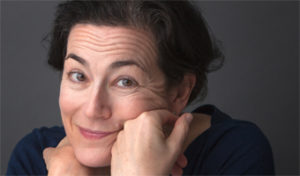Dinah Lenney is the author of Bigger than Life and The Object Parade. She serves as the senior editor at the Los Angeles Review of Books, and her work has appeared in numerous publications, including Creative Nonfiction, Brevity, and The New York Times Sunday Magazine. Lenney will give a reading on Thursday, Oct. 27, at 7:30 p.m., in the Walter Hall Rotunda.
By Morgan Cappel, intern for the Office of Special Programs
Dinah Lenney is both a writer and an actress, and her prose is studded with theatrical flourishes and a sort of stage presence as she creates a persona who can comment specifically, entertainingly upon any scene she finds herself in. Lenney’s newest book, The Object Parade, is a collection of essays that display these qualities. In it, she celebrates memory-inspiring objects, props perhaps, but the key word here is “parade”—because these objects allow Lenney to stage her memories for us. While we start in one place, we end up in another, as the essay-parades come to their idiosyncratic, humorous, touching grand finales. In Lenney’s writing, there’s something performative, we find, even when she’s reflecting on the most mundane thing.

Dinah Lenney; Photo by Daniel Reichert
In the essay, “Chicken Stew,” Lenney is quite worried about a party she’s having for an old friend, and she invites only the most eclectic of her acquaintances to impress him. The chicken stew she will prepare is, in her mind, the key to a successful evening. She knows the recipe by heart and, despite her husband’s doubts, insists it will bring everyone together. However, the party is ruined when the honored guest begins to talk politics, and the atmosphere turns hostile. Lenney clings to the power of the chicken stew, thinking to herself:
This is your chance to taste the risotto, simmered with saffron and mushrooms: Has anyone noticed how delicious it is? Somebody say something about the risotto, or the salad (that fennel! That sheep’s milk feta!), or the asparagus—so young, so green (Why, I steamed it with a little salt in the bottom of the pot, that’s the secret, that’s all, just ask, happy to divulge…).
Lenney turns back to the meal again and again—energetically, in the moment, improvising almost—and after everyone has gone, she ends with the food, uneaten:
You plop down on a chair at the table, smear a piece of garlic across a hunk of bread. Chew and swallow, then get up again to search for a container under the counter, something big enough to hold the leftover chicken—which, according to the recipe, is actually supposed to taste better tomorrow.
She thought this recipe had the power to unite people of different backgrounds, but it has failed her, even though it is with the chicken stew that everything began. With its aid, though, she remembers the tiniest details of the evening. And even if she wishes she could forget them, the power of this chicken stew to sustain this memory is what makes the essay poignant. And as our writer fixates on it, we encounter a deeply developed character in the writer.
In “Spice Chest,” Lenney does something similar with food and performance. The essay concerns a little cabinet she has inherited from her mother, for “Mustard, Nutmeg, Ginger, Pepper, Cinnamon, Allspice, Bay-Leaves.” It doesn’t mean much to her at first—she can’t even place where it was in her house—but Lenney stores a variety of things in the drawers now, from old coins to keys for safety deposit boxes. As she feels the compartments of the spice chest, she begins to recall the past:
Like memory—it smells like memory—like the deep bottom of something somewhere. Like time itself, nothing but time to play with marbles, and coins, and keys, and buttons; under the piano, in the window seat, on the stairs, in the cedar closet—at the kitchen table with my mother just there, chopping bunches of parsley, stirring a sauce, organizing her pantry.
She must only sniff the aging wood to find a dash of her mother inside the drawers. There is almost no literal action in this essay; it is a sensory experience, and scene-making. The touch of the writer’s fingers opens the chest and its memories, memories that would be out of her reach, locked away inside, had she left it alone. And that is the beauty of The Object Parade: Lenney won’t leave things alone. Like any great actor, she watches, she listens, she responds, she draws some feeling from her scene partner—the reader—and as her sentences gain steam, longer and longer—but never ponderous—we feel the quality of a rapturous soliloquy. Lenney doesn’t just write essays. She delivers them to the back row of the balcony.


















Comments